 |
4100 Johnson Road, Suite 203, Steubenville, OH 43952 Phone: (740) 264-5300 |
 |
 |
Wisdom Teeth
What are Wisdom Teeth?
The last molars to erupt in the back of your mouth are commonly known as Wisdom Teeth (Maxillary and Mandibular Third Molars). Normally a person will develop four wisdom teeth, but some people may have more or less.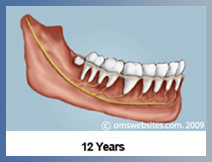 |
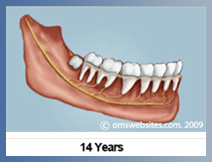 |
|
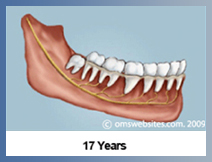 |
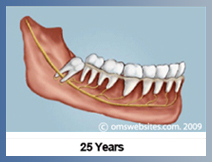 |
When and Why Should My Wisdom Teeth Be Removed?
A tooth becomes impacted because there is a lack of space in the dental arch, causing the tooth to grow on an angle towards the other molars and their roots.This impaction can cause pain, lead to infection, or cause other pathologic conditions (See Figure 1).
The wisdom tooth may also crowd or damage the adjacent molar and its roots (See Figure 2), or damage the jaw bone and its nerves.
When the wisdom tooth is growing toward adjacent teeth, it can trap plaque and debris making your teeth more vulnerable to decay.
Wisdom teeth will likely cause problems as the patient ages. Approximately 85% of wisdom teeth will need to be removed. Early removal of wisdom teeth is recommended before the wisdom teeth begin to cause problems in your mouth and to avoid more complicated procedures in the future.
What Does Removing My Wisdom Teeth Require?
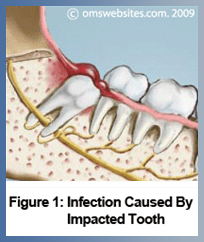 |
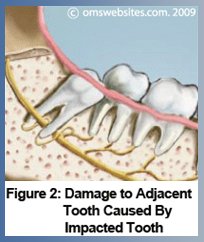 |
A wisdom tooth that is underneath the gums and pushed into the jawbone will require an incision into the gums and removal of the portion of bone that lies over the tooth. In this case, the tooth will be extracted in smaller portions to minimize the amount of bone that is removed.
Wisdom teeth can be removed using local anesthesia or some form of sedation. The anesthesia options will be discussed with you to determine what type of anesthesia is best for your needs.
What Does Recovery Involve?
After your wisdom teeth are removed you may experience some swelling and mild discomfort, which are normal symptoms and are part of the healing process.Why are Teeth Removed?
Severe decay, infection or insufficient room are all reasons that your dentist may recommend removing or extracting teeth.Impacted teeth that are partially erupted can cause a particular concern because bacteria can easily enter around the partially erupted tooth causing a possible extremely serious infection.
How are Teeth Removed?
During your initial visit, we will review your medical and dental history and take X-rays that will reveal the position of the tooth, its length and shape.The area around where the extraction will take place will be anesthetized with a local anesthetic prior to removal.
What can I Expect After an Extraction?
In order to prevent infection following your extraction, it is very important to keep the area clean. For the first 24 hours following the surgery, you should avoid cleaning the teeth adjacent to the extraction site, refrain from smoking or rinsing your mouth vigorously.You may experience a certain degree of pain or discomfort following an extraction. In certain cases, a pain killer may be recommended or prescribed.
You can also apply an ice pack to your face for 15 minutes at a time. You should avoid drinking hot liquids and not drink through a straw, and limit strenuous activity. The day after your extraction, you may be asked to gently rinse your mouth with warm salt water. If you experience severe or prolonged pain, bleeding, fever, or swelling, call us right away.
Website Design By OMSwebsites.com © 2009
